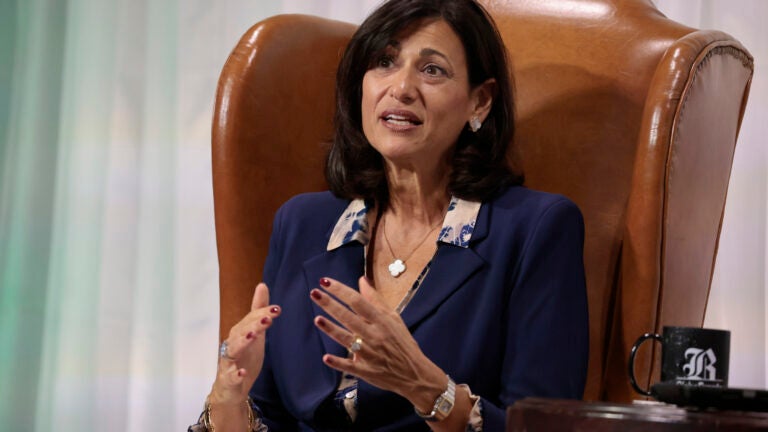Good health
In an interview during the Globe Conference, Dr. Rochelle Walensky spoke about her experience at the CDC during the pandemic, as well as the current state and future of public health.

At the Globe 2024 meeting, Dr. Rochelle Walensky, former director of the Centers for Disease Control, is interviewed. The conference, called The State of Public Health, was held in Harvard Hall, of the Harvard Club. Pat Greenhouse/Boston Globe Staff
As part of this year’s Globe Conference, former head of the US Centers for Disease Control and Prevention Dr. Rochelle Walensky sat down with Boston EarthSpokesperson for health and medicine Anna Kuchment on Wednesday to discuss the state of public health.
Walensky served as director of the CDC from 2021 to 2023, where he oversaw much of the government’s response to the COVID-19 pandemic.
Is the US headed for another pandemic?
To start the conversation, Kuchment asked Walensky how the country is prepared for the next pandemic. Walensky’s answer? “Very much.”
He said the CDC has workers in every state and more than 60 states trying to keep Americans safe and healthy.
“Our card says we are open 24/7. That’s when people work,” he said.
However, he cited current challenges facing the CDC, such as ineffective data collection methods. He said the CDC needs to improve its data to provide an effective and accurate response to a hypothetical outbreak.
What is driving low vaccination rates across the U.S.?
Walensky talked about low vaccination rates among Americans, both children and adults.
For children, Walensky cited an increase in parents exempting their children from childhood vaccinations. However, Walkensky said, many adults who don’t get their vaccinations avoid them because of insurance costs. He cited the CDC’s Vaccines for Children program, which provides vaccines to children whose parents or guardians cannot afford them. There is no government plan to help seniors get vaccines if they can’t afford them.
Walensky says the biggest issue preventing the country from improving vaccination rates is a lack of public trust.
He said: “That is the real issue.
Worries about bird flu and colds
The former director of the CDC has highlighted some diseases that we should watch out for in the coming months. He called the recent bird flu outbreak “concerning” and talked about how the virus appears to be moving to cattle herds across America. The virus was first detected in a Texas cattle herd in March, and has since spread to 14 states.
“I don’t sleep well knowing that bird flu exists,” he told Kuchment.
With flu season approaching, Walensky said he is concerned about the spread of the flu and bird flu. He explained how influenza can “mutate and mix” with bird flu to create a new strain.
Many of the symptoms of bird flu are similar to those of the flu, including fever, runny nose, muscle aches, cough and fatigue.
Massachusetts recently tested all 95 dairy herds in the state and reported them 100 percent free of bird flu, the first state to do so and get negative results.
“I’m very proud that Massachusetts was able to do that,” Walensky said. He said he hoped the Commonwealth “sets the standard” for other countries to follow suit.
Communities of color and COVID
One of the final parts of the discussion was about the response to COVID in communities of color.
A report analyzing data from the Massachusetts Department of Public Health found that the areas with the highest rates of COVID are areas where the majority of residents are people of color.
Walensky said that COVID has increased the public health divide in communities of color. He said the disease and the consequences of the epidemic affected “the most vulnerable people.” Walensky explained public health agencies need to account for this disparity when designing their responses to disasters like this pandemic.
He talked about how the CDC used its Public Risk Index to plan where they would install mass vaccination sites during a pandemic. However, Walensky says there is often a deep distrust of public health workers in communities of color because of past mistreatment. He stressed the need to improve public health issues in those communities, starting with building relationships of trust and respect.
“This is going to be hard, this is going to take a long time, this is going to be a commitment,” Walensky said.
Boston.com Today
Sign up to get the latest articles in your inbox every morning.
#Globe #Summit #News #CDC #Director #Rochelle #Walensky #state #public #health